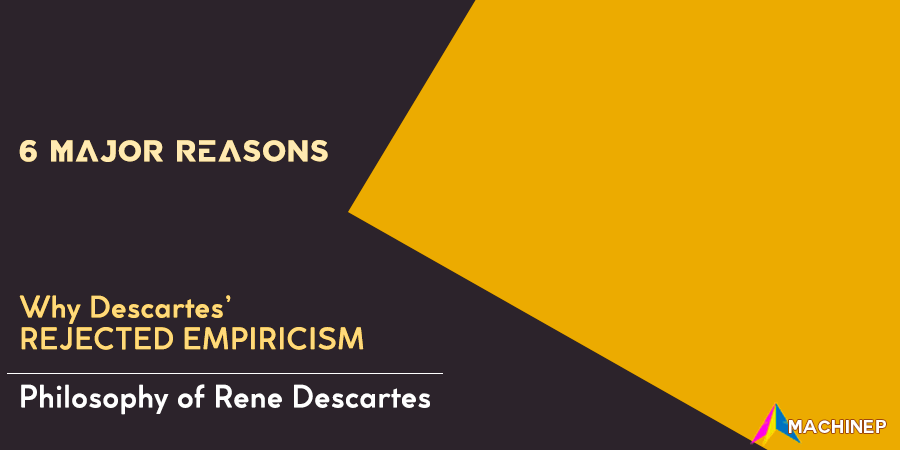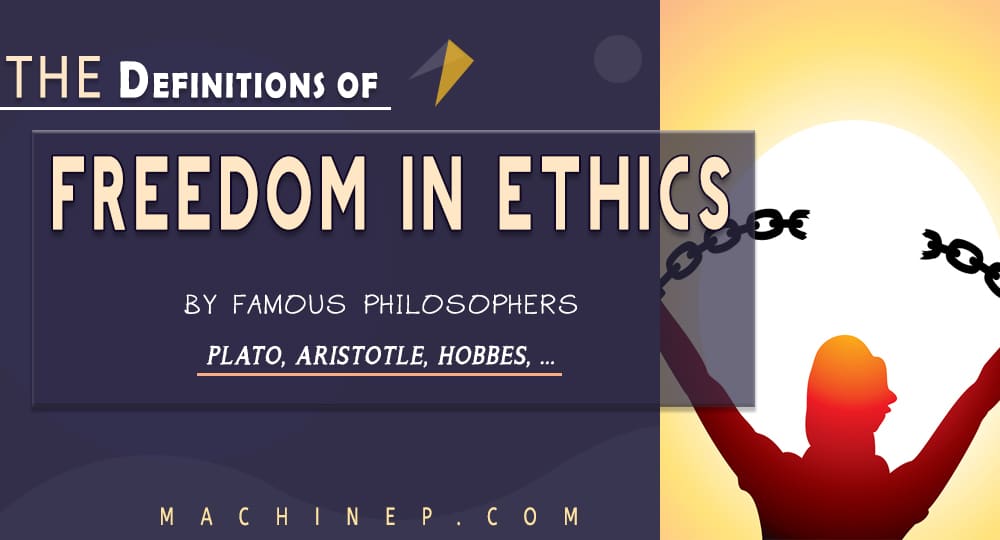Descartes practically justifies his rejection of empiricism with a couple of claims and reasons. To embrace rationalism, Descartes strongly champions the thoughts and ideas of rationalism as against Empiricism since they are closely in opposition. Keep in mind that this section is the heart of this philosophical discourse. The reasons are discussed in detail below with very much simplification.
6 Reasons Why Descartes Rejected Empiricism
- Science is Based on Reason
- Descartes’ Wax Argument
- Reason as the Essence of Humanity
- The Attainability of Knowledge
- The Case for the Externality of the Causes of Sensation
- The Case for the Materiality of the Causes of Sensation
1. Science is Based on Reason
Although Descartes mistrusted the information received through the senses, he did believe that certain knowledge can be acquired by other means, arguing that the strict application of reason to all problems is the only way to achieve certainty in science.
In Rules for the Direction of the Mind, Descartes argues that all problems should be broken up into their simplest parts and that problems can be expressed as abstract equations. Thus, Descartes hopes to minimize or remove the role of unreliable sense perception in the sciences. If all problems are reduced to their least sense-dependent and most abstract elements, then objective reason can be put to work to solve the problem.
Descartes’ work combining algebra and geometry is an application of this principle. By creating a two-dimensional graph on which problems could be plotted, he developed a visual vocabulary for arithmetic and algebraic ideas.
In other words, he made it possible to express mathematics and algebra in geometric forms. He also developed a method to understand objects’ properties in the real world by reducing their shapes to formulae and approaching them through reason rather than sense perception.
2. Descartes’ Wax Argument
The wax argument or the ball of wax example is a thought experiment René Descartes created in the second of his Meditations on First Philosophy. He devised it to analyze what properties are essential for bodies, show how uncertain our knowledge of the world is compared to our knowledge of our minds, and argue for rationalism.
Descartes has taken a piece of wax, and he has listed its main characteristics. Having considered the shape, texture, size, color, smell, and other features of the wax, Descartes has created a particular point of view about the piece of wax. However, after he melted this piece, another substance was seen.
It is essential to understand that this melted piece of wax was the same. However, its shape, texture, size, color, and smell changed. This is the main idea of the wax argument Rene Descartes has presented. To measure an object (wax in this case), Descartes recommends not to shift to the perceptions, feelings, and emotions; the deductive method is to be used to consider the issue.
Descartes uses the wax argumentation in consideration of God as an existing creation. A philosopher applies this theory, trying to explain that it does not matter that we are unable to see God; we understand that God exists. Thus, the perception is reduced to a minimum, and only the deduction is to be applied while considering this issue.
This trust in the things which are not certain is the central theme of Descartes and his philosophy. This is one of the main characteristic features of the wax argument. It teaches people not to see the object but to consider it the way one understands.
3. Reason as the Essence of Humanity
Descartes’ most famous statement is Cogito ergo sum, “I think, therefore I exist.” With this argument, Descartes proposes that the very act of thinking offers proof of individual human existence. Because thoughts must have a source, there must be an “I” that exists to do the thinking.
In arguments that follow this premise, Descartes points out that although he can be sure of nothing else about his existence—he can’t prove beyond a doubt that he has hands or hair or a body—he is certain that he has thoughts and the ability to use reason. Moreover, Descartes asserts that these facts come to him as “clear and distinct perceptions.”
Furthermore, he argues that anything that can be observed through clear and distinct perceptions is part of the essence of what is observed. Therefore, thought and reason, because they are clearly perceived, must be the essence of humanity. Consequently, Descartes asserts that a human would still be a human without hands, hair, or face. He also asserts that other things that are not human may have hair, hands, or faces, but a human would not be a human without reason, and only humans possess the ability to reason.
Again, unlike the rationalist, Descartes thinks that the idea of God, or perfection and infinity, and knowledge of one’s own existence is innate.
4. The Attainability of Knowledge
Descartes firmly believed that reason is a native gift of humans and that true knowledge can be directly gleaned not from books but only through the methodical application of reason. Thus, many of his books’ expressed aim was to present complex scientific and philosophical matters so that the least sophisticated readers could understand them.
Because Descartes believed that every human possesses the “natural light” of reason, he believed that if he presented all his arguments as logical trains of thought, anyone could understand them, and nobody could help but be swayed.
In the original edition of Discourse on the Method, in fact, Descartes declares his aim with the subtitle “In which the Author… explains the most abstruse Topics he could choose and does so in such a way that even persons who have never studied can understand them.” Moreover, in an attempt to reach a wider audience, Descartes occasionally wrote in French, the language of his countrymen, rather than Latin, the language of scholars, so that people without a formal education could understand him.
5. The Case for the Externality of the Causes of Sensation
Descartes builds on a familiar argument in the history of philosophy, an appeal to the involuntariness of sensory ideas. The familiar argument is articulated back in the Third Meditation. Speaking of his adventitious ideas (putative sensations), the meditator remarks:
I know by experience that these ideas do not depend on my will, and hence, they do not depend simply on me. On the contrary, frequently I notice them even when I do not want to: now, for example, I feel the heat whether I want to or not, and this is why I think that this sensation or idea of heat comes to me from something other than myself, namely the heat of the fire by which I am sitting.
At this Third Meditation juncture, the meditator remains in doubt about the existence of anything but himself—that is, himself insofar as he is a thinking thing, a mind. Thus, the familiar, involuntariness argument amounts to this:
- Sensations come to me involuntarily (I’m unaware of causing them with my will).
- Therefore, sensations are caused by something external to me.
- Therefore, there exists something external to my mind—an external world.
Though some such involuntariness argument has convinced many philosophers, the inference from 1 to 2 does not hold up to methodic doubt, as the meditator explains:
Then again, although these [apparently adventitious] ideas do not depend on my will, it does not follow that they must come from things located outside me. On the contrary, just as the impulses which I was speaking of a moment ago seem opposed to my will even though they are within me, so there may be some other faculty not yet fully known to me, which produces these ideas without any assistance from external things; this is, after all, just how I have always thought ideas are produced in me when I am dreaming.
Methodic doubt raises the problem of the existence of the external world. For all I know, my “waking” experiences are produced by processes similar to those producing my dreams. Thus, I cannot with certainty rule out the hypothesis that my sensations are produced by a subconscious faculty of my mind rather than by external objects.
For all I know, there might not be an external world. My inability to rule out this skeptical hypothesis explains why the familiar involuntariness argument fails. The inference from 1 to 2 presupposes exactly what is at issue—that involuntarily, ideas are not caused by a subconscious faculty of my mind.
Interestingly, Descartes would agree that experiential resources cannot solve the problem. By the Sixth Meditation, however, Descartes purports to have the innate resources he needs to solve it—namely, the innate ideas of mind and body. Among the metaphysical theses he develops is that mind and body have wholly distinct essences: the essence of a thinking substance is pure thought; the essence of body is a pure extension.
In a remarkable maneuver, Descartes invokes this distinction to refute the skeptical worry that a subconscious faculty of the mind produce sensations: “nothing can be in me, that is to say, in my mind, of which I am not aware,” and this follows from the fact that the soul is distinct from the body and that its essence is to think.
For from the additional premise that nothing can be in my mind of which I am unaware, it follows that if sensation were being produced by activity in my mind, then I’d be aware of that activity on the occasion of its operation. Since I’m not thus aware, it follows that my sensations are produced by causes external to my mind. The cause, remarks the meditator,
cannot be in me since clearly, it presupposes no intellectual act [viz., no volition] on my part, and the ideas in question are produced without my cooperation and often even against my will. So the only alternative is that it is in another substance distinct from me …
It follows that there exists an external world that causes my sensation. However, it remains to be shown that the external causes are material objects.
6. The Case for the Materiality of the Causes of Sensation
On Descartes’ analysis, the possible options for the external cause of sensation are three:
Three External Causes of Sensation by Descartes
- God
- material/corporeal substance
- some other created substance
The cause is either an infinite substance (God) or finite substance, and if finite, then either corporeal or something else. Thus, Descartes eliminates options (a) and (c) by appeal to God being no deceiver:
But since God is not a deceiver, it is quite clear that he does not transmit the ideas to me either directly from himself, or indirectly, via some creature … God has given me no faculty at all for recognizing any such source for these ideas; on the contrary, he has given me a great propensity to believe that corporeal things produce them. Therefore, it follows that corporeal things exist.
This is a highly problematic passage. Here, the “great propensity” is not the irresistible compulsion of clear and distinct perception, yet Descartes is nonetheless invoking a divine guarantee. Moreover, the moves Descartes is here making raise difficult interpretive questions.
According to the early position of the Meditations, we’re to withhold judgment except when our perception is clear and distinct. Yet here, Descartes appears to think we’re licensed to form a judgment in a case where our perception is not clear and distinct. Why does Descartes think this inference is licensed?
On one kind of interpretation, Descartes relaxes his epistemic standards in the Sixth Meditation. He no longer insists on indefeasible Knowledge, now settling for probabilistic arguments. Though no decisive texts indicate that this is Descartes’ intent, the interpretation does find some support. For instance, in the Synopsis, Descartes writes of his Sixth Meditation arguments:
The great benefit of these arguments is not, in my view, that they prove what they establish … In considering these arguments, we realize that they are not as solid or as transparent as the arguments that lead us to the knowledge of our own minds and of God …
The remark can be read as a concession that the Sixth Meditation arguments are weaker than the earlier arguments about minds and God. But, of course, one need not read the remark this way. And other texts are unfavorable to this interpretation.
For example, in the opening paragraphs of the Sixth Meditation, Descartes considers a probabilistic argument for the existence of external bodies. Though he accepts it as an argument to the best explanation, the argument is dismissed for the express reason that it grounds “only a probability”—it does not provide the “basis for a necessary inference that somebody exists.” This is a puzzling dismissal, assuming Descartes has relaxed his standards to probable inference.
It is often unnoticed that the conclusion of Descartes’ argument for the existence of an external material world leaves significant skepticism in place. But, granting the success of the argument, there is an external material world causing my sensations.
Conclusion
Descartes adhered to the rationalist school: He emphasized reason at arriving at truth rather than empiricism. Thus, he rejected empiricism and embraced rationalism for many reasons discussed above. Tying conclusions to sense experience was more of a British point of view, Francis Bacon, John Locke, et cetera – never mind that empiricists also believed in reason.
Descartes was French, and against empiricism, he used the Wax Argument: senses tell one that a piece of wax has certain characteristics, but if the wax is melted, the senses are demonstrated to have been wrong – a silly argument. He was using his own sense experience in trying to refute sense experience in general. So, as a rationalist, he believes in reaching conclusions through deduction and reasoning.







Peculiar article, totally what I was looking for.
Great job. I really enjoyed what you
had to say, and more than that, how you presented it.
Too cool!
I constantly emailed this webpage post page to all my friends, as if like to read it afterward my contacts will too.|
Fantastic article…